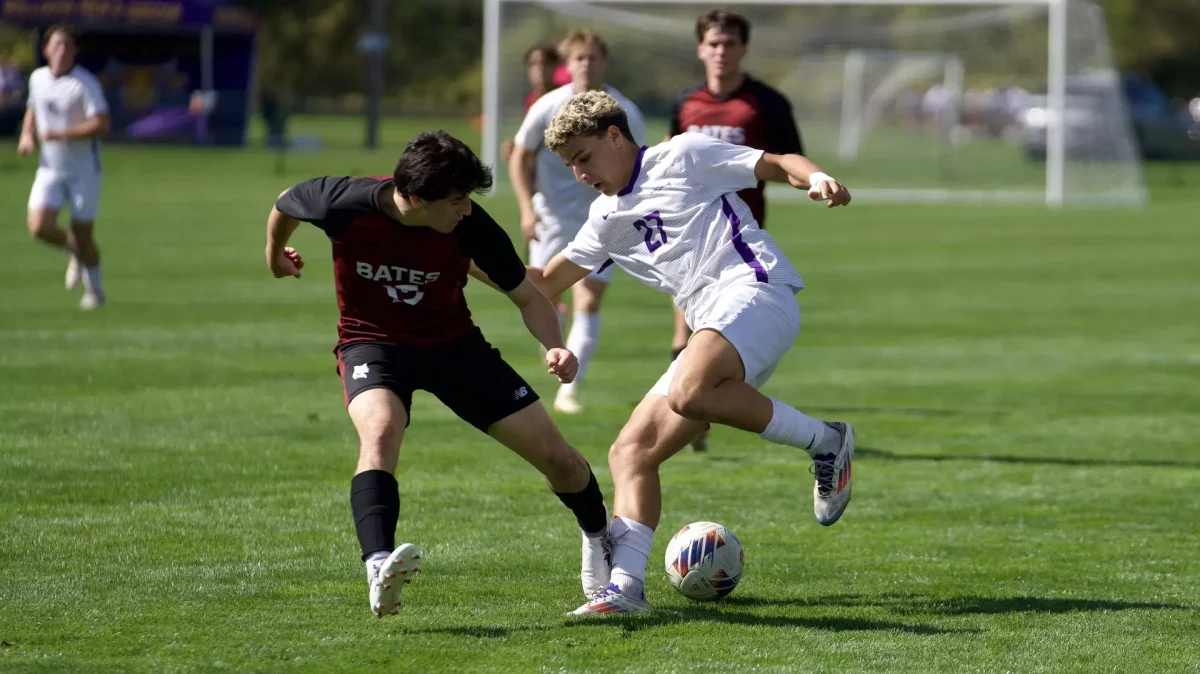The Committee on Educational Affairs introduced a proposal for a pilot Credit/No Credit (C/NC) policy to faculty during the monthly faculty meeting on April 10. The policy, which I co-wrote with two other students, Laura Sabino ’24 and Hikaru Hayakawa ’24, and an alum, Samuel Riley ’23, aims to increase academic exploration, student wellness, and institutional equity at the College. We believe that C/NC during the first semester of the first year is the most effective approach to address these issues.
For me, this policy formed out of the loss of my friend, Ahmad Praileau. The last three years spent developing this policy have been a labor of love and of remembrance. Still, too many struggle with their transition to Williams. It is a time when we had to simultaneously make new friends, adjust to new academic standards, and balance social, academic, and co-curricular commitments. Too many important things packed into no time at all. The transition is particularly difficult at Williams, as we are more geographically isolated and stressed with tremendous academic pressure. In addition, Williams is an elite predominantly white institution (PWI) and incoming students arrive with myriad backgrounds. For many, the transition to learning at Williams is jarring, especially for students with financial obligations to their families and those without previous engagement at elite educational institutions.
We believe the transition from high school to Williams requires immediate and transformative institutional action. While I understand faculty may have frustrations with changes to the grading system, I urge us all to think about the broader mission of Williams and the experiences and security we owe students. Incoming students need support now. Our C/NC policy meets the immediate needs of students, as it will ensure everyone receive an adequate transition period to adapt to the College’s academic and social environment.
Under the pilot, much of first-semester logistics would remain the same while vastly changing the student experience. Students would be able to take any course available to them, receive feedback and grades on assignments, retain the same number of available Pass/Fail uses, and gain credits for majors and graduation. The pilot would change how final grades from every student’s first semester appear on their official transcript: The courses they take during their first semester at the College would not affect their GPA and would show up as either Credit (“C”) or No Credit (“NC”) based on whether a student passed the course, analogous to the College’s existing Pass/Fail policy.
This C/NC policy aligns closely with those adopted by Swarthmore College, Wellesley College, and MIT, which have all continued their policies — MIT and Swarthmore for more than half a century. The proposal submitted to the faculty cites internal research conducted by these institutions showing a correlation between C/NC policies and an increase in academic exploration, student wellness, and institutional equity without negative impacts on academic engagement or student outcomes after graduation.
Under the policy, first-semester students, especially those from marginalized backgrounds, would have a greater ability to explore courses and academic areas of interest, engage in the residential goals of the College, and build lasting support systems. At the core of this proposal is a commitment to improving educational equity during the first-semester. It is paramount to develop policies intended to minimize the ramifications of this transition for marginalized students.
Indeed, achieving educational equity is an essential part of the College’s strategic plan, which states that “we need to invest in our values and find ways to enact commitments to diversity, equity, inclusion, accessibility, and sustainability throughout our work and lives.” MIT’s review of its policy shows that their C/NC policy has succeeded in this goal of allowing students time to “compensate for differences in their secondary school preparation” and concluded that “providing a relatively low-pressured environment in which such catching up can proceed — in a way that does not stigmatize students needing a little extra preparation — is unquestionably valuable.”
In addition, data from the Wellesley study also shows that students with below-median math skills are more likely to take STEM courses under the policy, suggesting that the policy removes barriers to important co-curricular opportunities. Similarly, a survey by the Office of Institutional Research at Wellesley reported that 92 percent of students surveyed agreed with the statement “I was more likely to stay in a challenging course rather than drop it,” under C/NC. These data provide clear evidence that a C/NC policy would support Williams’ goals of promoting equity by allowing for more education exploration and providing students time to get used to the College’s academic culture.
In addition to improvements in institutional equity, qualitative and quantitative studies on the C/NC policy at Wellesley and MIT demonstrate that the policy encouraged co-curricular exploration and reduced student stress and anxiety. These important goals are highlighted in the College’s strategic plan, which states that Williams is committed to both “attending to [student] mental, physical, and spiritual health in order to be the best at whatever they do in life” and to the ideal that “education is a blend of curricular and co-curricular excellence, further enriched by unstructured time and experience, including the development of friendships, explorations of place and of self, and simple reflection.”
In the previous edition of the Record, Professor Luana Maroja published an op-ed criticizing C/NC policy. In it, she emphasized how students from Wellesley reported that they spent more time making friends and participating in recreational activities under the policy. She argues that this was something to be avoided for non-privileged students, who would lose the incentive to study. Not only does this contradict the goals of the strategic plan and miss the importance of academic exploration, but research from Wellesley shows that students on financial aid actually preformed marginally better under the policy, as measured by their first-semester GPA, than the overall population. Her claims are also contradicted by MIT’s review, which found that giving non-privileged students time to catch up was “unquestionably valuable.”
In addition, data from MIT and Wellesley provide evidence that their C/NC policies improve student wellbeing. MIT’s review of its C/NC policy found that not only do students report feelings less anxious — a benefit in itself — but that this leads to further exploration in extracurriculars. Further, the review reports that faculty are “virtually unanimous in agreeing that this effect is good.”
Furthermore, the Wellesley study found that 94 percent of students agreed with the statement, “My transition to college was helped by shadow grading,” and 89 percent agreed with the statement, “My semester was less stressful because of shadow grading.” This shows clear and overwhelming evidence that this policy supports student wellness during their transition to college. Indeed, the increase in academic exploration cannot be disconnected from the improvement in student wellness. Students’ freedom to explore academically can provide deep joy in their lives.
Finally, the policy accomplishes all these things without sacrificing the long-term academic success of students. Research on C/NC at Wellesley shows no evidence that the policy affects the four-year cumulative GPA of students. Researchers found that the only effect on students’ grades was a 0.13 decrease in the GPA of students during the first semester — a decrease that amounts to two-fifths of the difference between an A and an A- at the College — and found no evidence that the policy affected students’ grades during any semester other than the first.
Because no other semester’s GPA was affected, these data contradict Maroja’s claim that “without a solid first base, it might be difficult to move on to advanced levels.” With all the beneficial effects that come with the policy, this 0.13 decrease during one semester — one not reflected on students’ final transcripts —is a small price to pay. In addition, MIT, Swarthmore, and Wellesley continue to send many successful graduates to medical and law schools, graduate schools, and competitive careers, showing that this policy does not impede upon students’ post-graduate opportunities.
Driven by the loss of Ahmad, this policy recognizes students continue to struggle to adapt to Williams. For too many, transitional and academic stress in the first semester impedes intellectual exploration, and hinders the creation of support systems necessary for personal growth and fulfillment. I implore the College to hold true to its commitment to provide students an equitable environment where they may pursue holistic growth. Bringing C/NC to first-years is a clear, evidenced-based, cost-effective, and broadly supported step towards a more curious and equitable community — towards a better Williams.
Cooper Desmond ’24 is a biology and religion major from Santa Cruz, Calif.
The following groups endorsed the policy presented at the faculty meeting: Central Americans for Empowerment, Chinese American Student Organization, Coalition for Immigrant Student Advancement, Firsts Student Union, Gargoyle Society, Native American Indigenous Student Alliance, Nihonjin American Student Union, Quare Collective, Sisterhood, South Asian Students’ Association, Williams African Student Organization, Williams Student Union. An organization’s decision to endorse a policy is determined by procedures laid out by its respective board.










